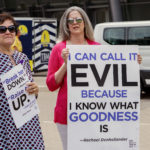ABERDEEN, Miss. (BP)—A federal court judge cited First Amendment legal precedent in dismissing a lawsuit against the North American Mission Board by a former executive of the Baptist Convention of Maryland/Delaware.
Senior Judge Glen Davidson of the U.S. District Court Northern District of Mississippi ruled April 22 that a lawsuit by Will McRaney would require the court to determine religious elements in the case—something “the court cannot do,” he wrote in a seven-page opinion.
Davidson, of the district court’s division in Aberdeen, Miss., addressed the three claims McRaney made in his April 2017 lawsuit seeking unspecified punitive damages that NAMB had: defamed him and harmed his career with the Maryland/Delaware convention as executive director, leading to his termination in 2015; harmed his ministry by causing cancelation of a 2016 speaking engagement in Mississippi; and caused emotional distress by posting a photo of him at NAMB’s welcome desk describing him as an enemy of the mission board.
Citing “ecclesiastical abstention doctrine, rooted in the First Amendment’s free exercise clause,” Davidson wrote, “The court dismisses this case for lack of subject matter jurisdiction.”
The doctrine is “built out of numerous Supreme Court cases affirming that churches have the ‘power to decide for themselves, free from state interference, matters of such government as those of faith and doctrine,’” Davidson wrote, citing 1952 precedent from Kedroff v. St. Nicholas Cathedral of Russian Orthodox Church in North America.
Regarding McRaney’s claim that NAMB had defamed him and interfered with his employment, Davidson wrote: “Review of these claims will require the court to determine why the BCMD fired McRaney—whether it was for a secular or religious purpose. It will require the court to determine whether the NAMB’s actions were done ‘without right or justifiable cause’—in other words, whether the NAMB had a valid religious reason for its actions. That the court cannot do.”
Davidson noted the same issue with the canceled speaking engagement, stating, “That matter the court cannot decide.”
Regarding McRaney’s claim of emotional distress from the photo and description as an enemy of NAMB, Davidson wrote: “Once again, to resolve these issues, the court will need to make determinations about why the NAMB held these opinions of McRaney, and because the NAMB is a religious institution, the question will touch on matters of religious belief. The court, therefore, finds that under the First Amendment it lacks subject matter jurisdiction to adjudicate McRaney’s disputes.”
The state court where McRaney initially filed suit likewise would not be able to deliberate in such First Amendment matters, Davidson wrote. The case had been transferred to federal court under federal law permitting NAMB to make the request because the plaintiff and defendant were residents of different states.
Sign up for our weekly edition and get all our headlines in your inbox on Thursdays














We seek to connect God’s story and God’s people around the world. To learn more about God’s story, click here.
Send comments and feedback to Eric Black, our editor. For comments to be published, please specify “letter to the editor.” Maximum length for publication is 300 words.